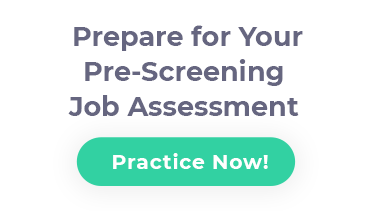Aerospace & Defense Psychometric Tests, Hiring Process & Interviews Online Preparation – 2025

Working in the Aerospace and Defense Companies
Aerospace and defense are in-demand fields that are continuing to expand as strides in technology are made. The aerospace field concerns engineering air and spacecraft. This can be done as a private sector civilian company, or as a segment of the government’s department of defense. Aerospace jobs in defense can be performed as a government employee, or as a contractor from a company does work for the government. Often aerospace companies have both civilian and government divisions. Jobs in aerospace and defense consist of more than just engineering. There are positions for machine operators who do the actual building of the aircraft, maintenance workers, financial analysts, proposal writers, and varying levels of management. Internships are common in both the civilian and defense divisions of aerospace, with many new hires for entry-level positions coming directly from their internship programs.
What Is the Interview Process in Such Companies?
Application
There are several ways to apply for positions in aerospace and defense. You can apply through the company website, by finding their careers page and uploading your resume and CV with a cover letter. Many companies hold frequent job fairs, which are open to both graduates and experienced employees. At job fairs, you can speak directly to a recruiter, and give them a copy of your resume and cover letter. If you are submitting your resume at a job fair, be sure to present a professional appearance so you stand out favorably in the recruiter’s mind.
Psychometric Tests
Your performance on the online assessment tests will determine if you are able to make it to the next stage of the hiring process. The online assessments are given to help the hiring managers narrow the field of applicants down to only the very best possible candidates. There will be some difference in the tests based on the position you are testing for, with a different combination of tests for each job title. Tests that are commonly given in this industry are:
- Personality Test – Aerospace and defense companies, need to have a good idea of the personality of their applicants before they make hiring decisions. They need to be sure that the people they interview possess integrity and a strong work ethic. Most companies will match job candidates’ personality test results against a profile they have created of the ideal personality type to fill that position.
- Situational Judgment Test – The SJT assessment is another psychometric test that is used to help determine your potential job performance. This test will present you with various scenarios that may occur on the job. You will need to select the best possible response from the options given.
- Numerical Aptitude Test – To find out how strong your data analyzing skills are, you may be given a numerical reasoning exam. You will be given charts and graphs and will need to extrapolate the data within a given time frame.
- Logical Reasoning Test – Being able to recognize trends and patterns is an important part of work in the aerospace and defense industry. The logical reasoning test will measure this ability by presenting you with patterns and sequences you must finish by picking the right series of shapes.
- Mechanical Reasoning Aptitude Tests
Interviews
The first interview when applying for a position with an aerospace and defense company is a competency-based telephone interview. They will ask you questions about the information on your resume or CV and will talk to you about your motivations and experience. This is a good time for you to ask any questions you have about the company and the position. This helps establish that you really are interested in the job.
If the phone interview goes well, you will be invited to interview at one of the company’s offices. This interview will be behavioral and will go into detail. This interview may last at least an hour. This interview may be conducted using the STAR method. Standing for situation, task, action, result, this interview method is a way for the hiring manager to get detail about your past work history. They will ask you to describe a situation you once faced at work, describe the task that you faced to solve the situation, the actions you took, and the result. This interview method gives an idea of your working style, your ability to work on a team, and how you have grown in your professional life.
Common Positions in the Industry
- Management
- Engineering
- Machine Operating
- Sales
- Customer Service
- Maintenance
- Finance
- Analyst
How to Prepare for these Assessments?
Your performance on the online assessment tests will determine if you are selected for an interview, or if your application will be tossed to the side. The first step in preparing for the tests is learning as much about the company and its corporate culture as possible. This will give you an idea of the values they hold, and the traits they want to see in their employees. This will help prepare you for the personality and the situational judgment tests. Practicing logic puzzles and sudoku can help sharpen your logical reasoning skills prior to testing and reviewing your math’s skills will also be of benefit so you can approach the numerical reasoning test confidently.
Take the test in an area free of distractions. Many assessment tests are designed to evaluate how you perform under pressure. Do not allow this to make you nervous or feel rushed. Take your time without allowing yourself to get caught up on one question. If you find yourself stuck simply move on to the next question. A cool head and proper preparation will help you easily pass the online assessment tests, and receive the job offer you have been waiting for.
The Leading Aerospace & Defense Companies in the World
| Astronics Corporation |
Dassault Aviation |
General Electric |
Liebherr |
Safran |
| Aerospace Research Systems |
Lord Corporation |
Amphenol |
Astra |
Arconic |
| Korean Air Aerospace Division |
General Dynamics |
Parker Hannifin |
AerSale |
Hexcel |
| Israel Aerospace Industries |
Crane Aerospace |
Axiom Space |
Latécoère |
Sonaca |
| Turkish Aerospace Industries |
United Technologies |
Nordam Group |
Aernnova |
JAMCO |
| Mitsubishi Heavy Industries |
Precision Castparts |
ASCO Industries |
Atec |
Qinetiq |
| Aerojet Rocketdyne Holdings |
Albany International |
ITT Corporation |
AirLaunch |
Praxair |
| Aerotech Consumer Aerospace |
Aerojet Rocketdyne |
United Aircraft |
Airbus |
Aerojet |
| Kawasaki Heavy Industries |
Subaru Corporation |
ST Engineering |
Textron |
AIDC |
| Korea Aerospace Industries |
Magellan Aerospace |
Ball Aerospace |
Meggitt |
MDA |
| Aerospace Testing Alliance |
Aerovel Corporation |
Curtiss-Wright |
Cobham |
AKS Inc |
| ASRC Aerospace Corporation |
Alliant Techsystems |
Kaiser Aluminum |
Airware |
Thales |
| Sierra Nevada Corporation |
Applied Aeronautics |
AAI Corporation |
Leonardo |
Harris |
| The Aerospace Corporation |
Armadillo Aerospace |
Align Aerospace |
Honeywell |
Eaton |
| Aviation Technology Group |
Avidyne Corporation |
GKN Aerospace |
Bombardier |
SKF |
| Rostec State Corporation |
Spirit Aerosystems |
Triumph Group |
Esterline |
Daher |
| Recaro Aircraft Seating |
Panasonic Avionics |
Héroux-Devtek |
Chromalloy |
Senior |
| Allegheny Technologies |
Diehl Aerosystems |
Andrews Space |
Hutchinson |
Garmin |
| Ad Astra Rocket Company |
Aerojet Rocketdyne |
Elbit Systems |
Raytheon |
AVIC |
| AGC Aerospace & Defense |
Embraer |
Rolls-Royce |
Boeing |
IHI |
| Aymar-DeMuth Propellers |
Allied Corporation |
Solvay Group |
Woodward |
SAAB |
| Teledyne Technologies |
Northrop Grumman |
Constellium |
ShinMaywa |
MOOG |
| Acorn Growth Companies |
MTU Aero Engines |
Kongsberg |
AdamWorks |
Heico |
| Hindustan Aeronautics |
Barnes Aerospace |
Figeac Aéro |
Ducommun |
RUAG |
| Altius Space Machines |
Lockheed Martin |
Martin-Baker |
Transdigm |
LISI |
| Astrobotic Technology |
Kaman Aerospace |
Aeronutronic |
AAR Corp |
FACC |
| Astrotech Corporation |
L-3 Technologies |
BAE Systems |
Pilatus |
CAE |
| Atomics International |
Rockwell Collins |
AEi Systems |
GE Aviation |
Lear |

